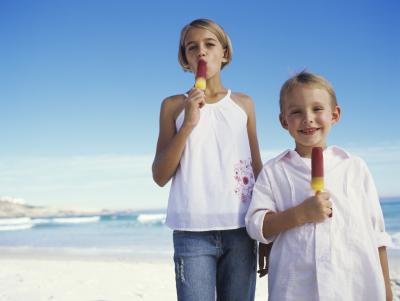Even though they’re called cold sores or fever blisters, these fluid-filled swellings have nothing to do with a cold or a fever. A cold sore is a contagious herpes virus that your child probably contracted from sharing a cup, toy or utensil with someone who has it. A kid can also get a cold sore if someone with the active virus — visible sore or not — kisses him. Most kids get a cold sore at some point during their childhood; the virus may flare up again or lie dormant forever.
Newborns
Two type of herpes virus exist, affecting the mouth or the genitals. The genital type is a sexually transmitted disease. Newborn babies can get herpes through the birth process. If your newborn develops skin or mouth sores, a rash, fever or irritation of the eyes or eyelids about six to eight days and up to a few weeks after you give birth, call your doctor immediately. Herpes could cause brain or lung infections or liver disease in a newborn. Your baby may require hospitalization and intensive care.
Symptoms
The first time your child develops the herpes infection that caused the cold sore, she will probably have a mouth sore or sores, swollen and red gums, a fever and swollen, tender glands. Call your doctor if your child has these symptoms. The sore or sores heal over in about seven to 14 days. After the symptoms pass, the virus stays dormant in your child’s nerve cells. She now carries the virus. The virus could become active again, especially with certain triggers, such as cold or hot weather, stress, fatigue, fever or sunlight. With flare-ups, your child probably won’t have any symptoms besides the blisters. The virus could remain dormant, however, for the rest of your child’s life.
Treatment
You can usually treat a child’s mouth sores at home. In fact, most of the time, the cold sores go away on their own. Tell your child to wash his hands frequently, and prevent him from picking at or scratching the sores. Offer plenty of fluids, but avoid acidic juices, such as orange juice, which can irritate the area. Apply ice to the cold sores to help with any discomfort, or offer flavored ice on a stick.
Medicines
If your child complains of discomfort and pain from the cold sores, you can give her a child’s dosage of acetaminophen or ibuprofen. Or see her doctor, who may prescribe an antiviral medicine to keep the virus from spreading, reduce symptoms and help the cold sores heal more quickly. The doctor may also prescribe a numbing liquid.
Prevention
The best way for your child to prevent contracting cold sores is to avoid physical contact with someone who has active sores. Because people can carry the virus in their saliva, it’s best for your child not to share drinking glasses or utensils.





